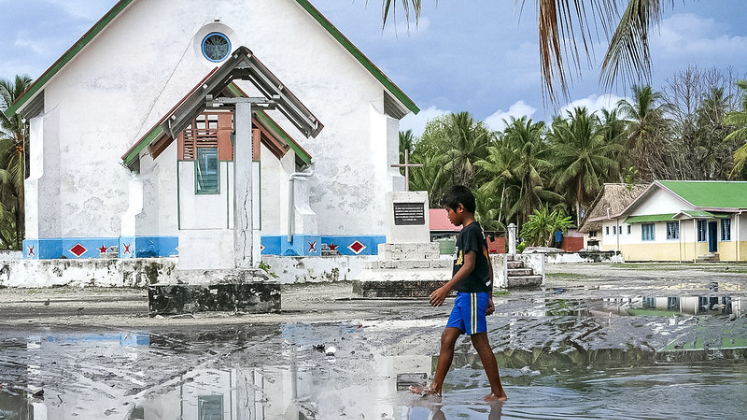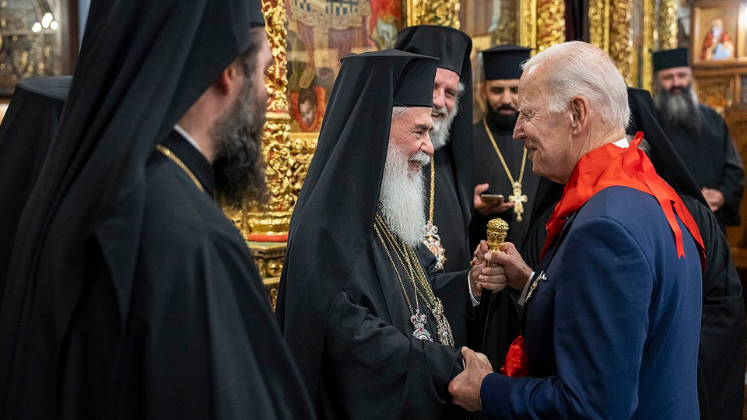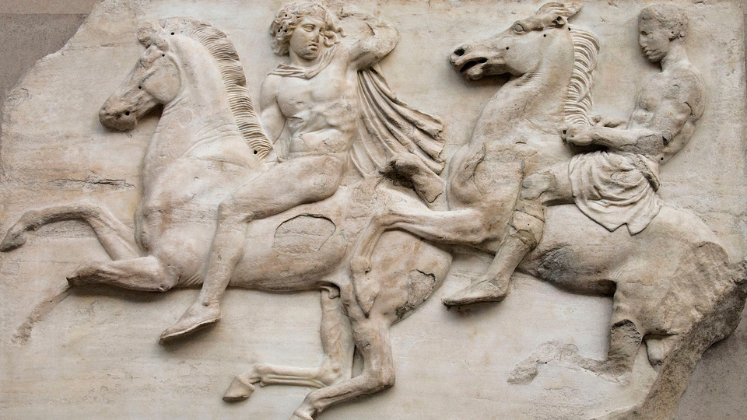Earlier this year, LSE Religion and Global Society researchers held an interfaith climate workshop for grassroots religious clerics and community leaders. Here, Cameron Howes highlights some of the workshop’s key lessons for engaging with faith groups on climate issues.

As we approach COP28, commentators and observers may be surprised by two high-profile collaborations from the United Nations Environment Programme (UNEP).
A faith leaders’ pre-conference summit co-sponsored by the Muslim Council of Elders (MCE) and the Catholic Church, and a first-of-its-kind Faith Pavilion at the conference itself, again in partnership with MCE.
If this surprised you too, you’d be forgiven as, to date, faith perspectives have remained very much at the fringes of environmental politics. To sceptics these initiatives could still be understood as marginal, however, they emerge from a growing recognition that it is increasingly important to engage faith groups on the issue of climate change.
Why should we engage faith groups on climate issues?
According to the Pew Research Centre, faith groups are forecast to represent 87% of the world’s population by 2050 and this growth will be concentrated in regions subject to higher adverse impacts of climate change. This intersection will be felt most severely within Muslim communities, who are projected to be the fastest growing group within some of the most precarious and vulnerable territories, as the recent disaster from extreme weather in Libya tragically highlights.
UNEP’s faith partnerships and the back-to-back hosting of COP27 and COP28 within Muslim-majority countries are timely and welcome. However, these well-intentioned engagements are limited by instrumental and symbolic barriers. The UN primarily views senior faith leaders as optional add-ons to intergovernmental processes or vehicles to cascade secular and scientific environmental education. This has the effect of alienating religious communities who feel talked down to by an outside power from a frame of reference that has little relevance.
Even when senior faith leaders attempt to bridge this gap through religious teachings, rulings and joint declarations (e.g. Laudato Si, Egyptian Climate Fatwa, Interfaith Talanoa dialogue), everyday sentiments of suspicion towards formal religious hierarchy can reduce the power and resonance of these interventions. This is particularly acute in Middle East and North African (MENA) contexts where religious authorities are implicated in state-imposed restrictions on freedoms and economic inequality.
How can we engage faith groups on climate issues?
If this top-down model of engagement isn’t leading to a more motivated and mobilised civil society then what is the alternative? Earlier this year, my team at LSE Religion and Global Society collaborated with the British Council in Egypt to design and deliver an interfaith climate workshop for grassroots religious clerics and community leaders. The workshop used interfaith and participatory dialogue methods to guide delegates to identify environmental language and imagery within and between their religious traditions that speak to the cultural context of Egyptian society. How did we attempt this?
Centring of religious texts
For participants, sacred texts and their accompanying written and oral commentary traditions are the bedrock of knowledge production in a shared endeavour of discerning God’s purposes. Any sense-making exercise without God at the centre makes no sense at all. We collated scriptural passages and appropriate theological commentaries to stimulate reflection within thematic conversations, inviting participants to draw on their ‘internal libraries’ for further relevant references and teachings.
Modelling of interreligious literacy
Our facilitating team represented a mixture of religions, and all of them were familiar with reciting and commenting on texts from their own and other traditions, giving our participants permission and confidence to do likewise.
Exploratory encounter
From the outset our team created a space that foregrounded the co-production of knowledge within the room. Small group discussion activities were the focal points of the day to explore integrating existing knowledge within alternative frameworks, with organiser input limited to thematic and contextual contributions to facilitate reflection.
Multiple operational languages
Any attempt to bridge or integrate knowledge domains across cultures demands an inherent respect for language. The role of Arabic as both a modern-day dialect and a language of scripture and revelation that imbeds multiple layers of meaning made its use essential. Navigating mixed fluency across Arabic and English required investing in high quality translators and producing a bi-lingual activity handbook.
Three promising insights
It is still early to be talking about impact in our continuous engagement with partners and participants, but we do have three promising initial insights.
First, engaging in this way led to a tangible shift in a sense of belonging within the climate discourse and associated environmental politics. Participants, some for the first time, saw responses to the climate as originating within their spiritual traditions rather than as a foreign imposition, leading to a greater willingness to engage with the secular and scientific discourse. After the workshop, orthodox Christian clerics returned to original texts that have encouraged a renewed eco-theology, and a female Muslim preacher has been inspired to adapt her master’s degree towards climate theology.
Second, in a context where interreligious engagement can be contentious, as intergroup trust and contact are influenced by intermittent political violence and extremism, the topic of climate is one that feels uncontroversial. It is less attached to thornier theological questions about creed and doctrine that can precipitate anxiety when engaging with each other’s scriptures. Such interaction paves the way for joint action on climate, something our participants themselves pushed for, alongside longer-term conflict resilience.
Third, we reflected on the emerging phenomenon of eco-anxiety. Not only has the global north abjectly failed to prepare an adequate response to climate change; it is also utterly unprepared to fail in its mitigation ambitions. Its relatively affluent citizens cannot imagine the world of vulnerability and precarity they will come to inhabit, and the looming spectre feels apocalyptic. But for the congregations of our Egyptian colleagues, vulnerability and precarity is their everyday experience, and their faith endows them with a path to navigate it justly and without paralysis, something hopeful, that is truly worth sharing.
This blog originally appeared on the Bond NGO blog and can be found here.






1 Comments